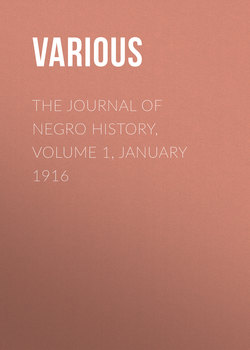Читать книгу The Journal of Negro History, Volume 1, January 1916 - Various - Страница 11
The Journal of Negro History
Vol. I., No. 1 January, 1916
Letters Showing the Rise and Progress of the Early Negro Churches of Georgia and the West Indies 89
An Account of Several Baptist Churches, Consisting Chiefly of Negro Slaves: Particularly of One at Kingston, in Jamaica; and Another at Savannah in Georgia
To the Rev. Mr. John Rippon
ОглавлениеKingston in Jamaica, Nov. 26, 1791.
Reverend Sir,
The perusal of your letter of the 15th July last, gave me much pleasure–to find that you had interested yourself to serve the glorious cause Mr. Liele is engaged in. He has been for a considerable time past very zealous in the ministry; but his congregation being chiefly slaves, they had it not in their power to support him, therefore he has been obliged to do it from his own industry; this has taken a considerable part of his time and much of his attention from his labours in the ministry; however, I am led to believe that it has been of essential service to the cause of GOD, for his industry has set a good example to his flock, and has put it out of the power of enemies to religion to say, that he has been eating the bread of idleness, or lived upon the poor slaves. The idea that too much prevails here amongst the masters of slaves is, that if their minds are considerably enlightened by religion or otherwise, that it would be attended with the most dangerous consequences; and this has been the only cause why the Methodist ministers and Mr. Liele have not made a greater progress in the ministry amongst the slaves. Alas! how much is it to be lamented, that a full quarter of a million of poor souls should so long remain in a state of nature; and that masters should be so blind to their own interest as not to know the difference between obedience inforced by the lash of the whip and that which flows from religious principles. Although I much admire the general doctrine preached in the Methodist church, yet I by no means approve of their discipline set up by Mr. Wesley, that reverend man of God. I very early saw into the impropriety of admitting slaves into their societies without permission of their owners, and told them the consequences that would attend it; but they rejected my advice; and it has not only prevented the increase of their church, but has raised them many enemies. Mr. Liele has very wisely acted a different part. He has, I believe, admitted no slaves into society but those who had obtained permission from their owners, by which he has made many friends; and I think the Almighty is now opening a way for another church in the capital, where the Methodists could not gain any ground: a short time will determine it, of which I shall advise you.–I really have not time to enter so fully on this subject as I wish, being very much engaged in my own temporal affairs, and at present having no clerk.–The love I bear to the cause of God, and the desire I have of being any ways instrumental to the establishing of it in this land of darkness, has led me to write this: but before I conclude, I have some very interesting particulars to lay before you:–Mr. Liele has by the aid of the congregation and the assistance of some few people, raised the walls of a church ready to receive the roof, but has not the means to lay it on and finish it; nor do I see any prospect of its going further, without he receives the aid of some religious institution from home. One hundred and fifty pounds, I think, would complete it; and if this sum could be raised, it would greatly serve the cause of GOD, and might be the means of bringing many hundred souls, who are now in a state of darkness, to the knowledge of our great Redeemer. If this could be raised the sooner the better. Our family contributed towards the purchase of the Methodist chapel; nor shall our mite be wanting to forward this work if it meets with any encouragement from home.–I am a stranger to you, but you may know my character from Daniel Shea, Esq.; and John Parker, Esq.; merchants in your city; or from Mr. Samuel Yockney, tea-dealer, in Bedford Row.
Perhaps you may expect me to say something of Mr. Liele's character. He is a very industrious man–decent and humble in his manners, and, I think, a good man. This is my opinion of him. I love all Christians of every denomination, and remain, with respect and sincere regard,
Reverend Sir,
Your friend and servant,
(Signed) Stephen Cooke.
–-Baptist Annual Register, 1790-1793, pages 338 and 339.
